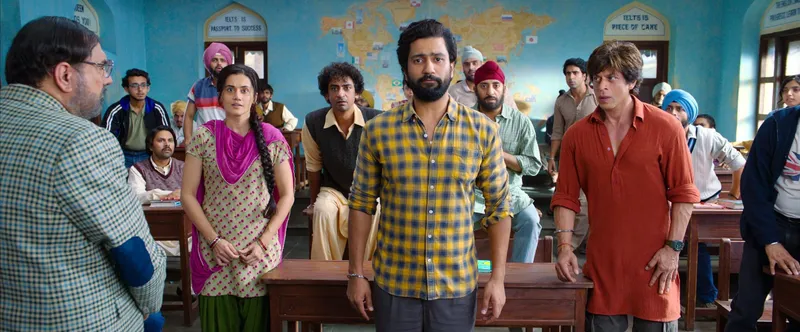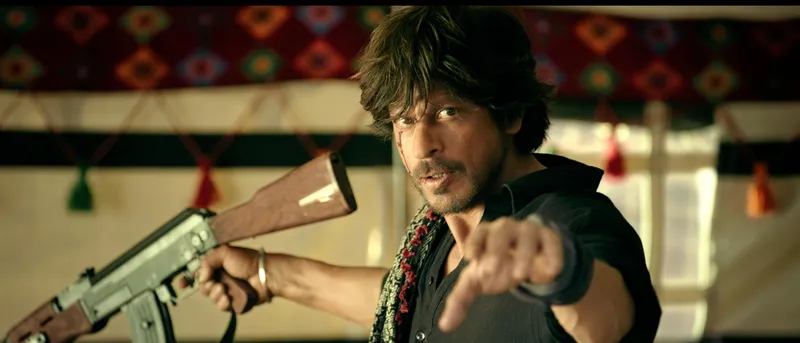Dunki is an imperfect but moving tale of illegal immigrants with an SRK romance at its heart
While its story and execution don’t quite add up, Dunki delivers the poignant struggle of a failed NRI dream with humour and emotion.
Starring: Shah Rukh Khan, Taapsee Pannu, Vicky Kaushal, Boman Irani, Anil Grover, Vikram Kochhar, among others
Leaving your country to pursue a better future elsewhere is not easy. The journey becomes unimaginably hard and unrewarding if you’re migrating to the West illegally. Filmmaker Rajkumar Hirani explores the immigrant Indian experience and digs out the ugly side of the NRI dream through the premise of a heartfelt romance in Shah Rukh Khan starrer Dunki.
The story is set in Lalto, a village in Punjab where the poor and underprivileged aspire to go to England to build a future. Manu (Taapsee Pannu) is in debt and has lost her home. Balli (Anil Grover) works as a barber to help his mother who toils for long hours as a tailor. Buggu (Vikram Kochhar) is unhappy with his mother’s job as a security guard. Each one works a menial job and dreams of going to England to help their families.
Hardy (Shah Rukh Khan) arrives at the village and is instantly drawn into the aspirations and efforts of these three friends. Together, they enrol for an English language class run by Geetu Gulati (Boman Irani) to clear the IELTS exam and get a student visa for England. In this class, Sukhi (Vicky Kaushal) stands out for his desperate struggle to rescue someone he loves, and his inability to speak English prevents him from getting a regular visa to go to England.

Image source: IMDB
While their patchwork efforts don’t pay off, Hardy is determined to take Manu and Buggu to England, and together they set off on an illegal route—battling threats to life, gunfire, and harsh nature.
The movie comes at a time as conversations around immigration have reached a fever pitch in the West, with countries like the UK and France bringing stringent laws to curb the influx of immigrants. In 2022, Over 2.25 lakh Indians renounced their citizenship—the highest ever.
Hirani isn’t afraid to touch such a topical subject. He has previously tackled sensitive issues like religious superstition in PK! In Dunki, his ability to draw laughs around touchy subjects like death, the national anthem, or the examination system to get a visa, or place of worship remains intact.
For a man who rarely speaks out, Hirani lets his films do the talking.
Dunki is tragi-comic in parts, drawing humour from the plight of the poor and less privileged without minimising their challenges. In capturing the hardship of crossing foreign territories without visas, the film unconsciously shows the incredible beauty of these borderlands that seem straight out of a National Geographic documentary. However, the barren beauty is tragic, home to skeletons of illegal immigrants who died in their attempts to cross these lands. Their bodies or deaths don’t make it to any country’s statistics.
The narrative of Dunki comes with an emotional core but its story doesn’t always add up. Harry’s choice to cross borders illegally is not well-reasoned. As a soldier who has assets to his name, he could have tackled Manu’s financial woes and immigration plans without breaking laws. Manu’s final decision doesn’t come across as convincing either. Some scenes, like Hardy’s disillusion with the foreign returned Punjabi, are forced and come across as a quick fix to strengthen the plot. The last eighteen minutes, particularly, don’t hold up.
But Hirani has gone for a larger argument here. He has turned the illusion of a rosy, foreign dream, sung about in Bollywood songs, on its head. Not all is hunky dory on foreign shores for Indians or other immigrants. The immigrant experience for many is about being janitors, cleaners, or casual labourers, and doesn’t come without discrimination and prejudice. It limits an immigrant’s aspirations and reduces one to a lesser class of people. The movie also refers to domestic violence many Indian brides face overseas.
Watching Dunki (the title refers to the Donkey Route to go to Europe) brought back memories of a conversation with a Bangladeshi clothes salesman in Rome. Sitting on the steps of a church in this ancient city, his tale of moving to Bulgaria and finally landing up in Rome to sell clothes from tents during tourist season was nothing short of horrific. But he was happy to have just survived and could send money home. Dunki captures this less-discussed side of the immigrant story.
As for performances, Pannu sparkles in her role. Her cadence and body language are bang-on. Kochhar and Grover carry off their parts effectively. Kaushal is brilliant and consistent with his naturalistic acting. But Khan, while very good-looking and convincing in some scenes, comes across as affected in parts. As Hardy, especially the older self, he doesn’t feel natural, adapting to a character who is too much of a good Samaritan. Fortunately, he retains his magic of playing the romantic hero and is polished to shine in the film.

Image source: IMDB
The film’s cinematography (C K Muraleedharan, Manush Nandan and Amit Roy) stands out with top names in the industry involved. The world would be a beautiful place if it didn’t have borders, and Dunki shows this to us.
Its music is fairly catchy with the song O Mahi (Arijit Singh, lyrics by Irshad Kamil, music by Pritam) being the most melodious number. Lutt Putt Gaya (Arijit Singh, music by Pritam, lyrics by Swanand Kirkire and IP Singh) is a spirited track with some atypical SRK dance moves.
At a time when a prime minister in Europe has called ‘Islam’ incompatible with Europe, the movie brings up a timely and important conversation.
While Dunki doesn’t have a finessed argument, it has its heart set in the right place. Home is where the heart is.
Rating: 3.5/5
Edited by Kanishk Singh







